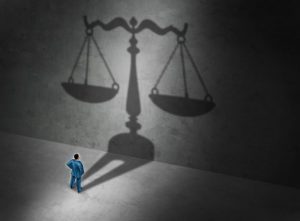
(Image via Getty)
Bar exam plans are in shambles. The July administration is obviously off and the plan to offer a test in the Fall has run up against the concrete logistical concern that there simply isn’t enough space to cover every applicant and that’s before trying to deal with a wave of young lawyers who will need extended leave or to be laid off to take a future exam while shouldering student loan payments.
The only good solution to this is a form of diploma privilege licensure — something Utah has already figured out. But entrenched interests worry, probably rightfully, that if a diploma privilege system ends up working on a temporary basis, everyone is going to look around and realize the bar exam wears no clothes. That’s why we’re seeing these laughably bad defenses of the bar exam coming from the NCBE, an entity that doesn’t just want to maintain the bar exam, but maintain it in its exact form leaving them with a monopoly over the testing regime across the country.

How Innovative Legal Teams Are Turning AI From Promise To Practice
In recent years, AI has moved beyond speculation in the legal industry. What used to be hypothetical is now very real.
Massachusetts isn’t ready to junk the bar exam, but recognizes that it’s not going to happen any time soon and that a makeup exam is a logistical nightmare. That’s why the state is talking about an online bar exam to allow applicants to go through the test without forcing the state to ration seats for a series of in-person exams. It’s the sort of reasonable accommodation one would expect states to undertake and consequently it’s one that the NCBE won’t get behind. Apparently fed up with this hemming and hawing, Massachusetts is signaling that they’re willing to write their own bar exam to make this happen.
From Law.com:
Massachusetts will create and deliver its own online bar exam if it’s unsafe to administer the traditional test in late September—the rescheduled date for the July exam.
The Massachusetts Supreme Judicial Court and the Massachusetts Board of Bar Examiners unveiled those plans Thursday, making it the first jurisdiction to commit to an online test as a fallback amid the COVID-19 outbreak.
This plan to create its own exam comes as the NCBE continues to claim that it finds “significant issues” with administering its exam online, despite the fact that every law school has already figured out how to use the webcam panopticon to keep everyone honest. Massachusetts is done waiting for a solution and assured the law schools that there will at least be a Massachusetts admission only version of the exam to take online.

Pursuing The Pro Bono Story: A Conversation With Alicia Aiken
This Pro Bono Week, get inspired to give back with PLI’s Pursuing Justice: The Pro Bono Files, a one-of-a-kind podcast hosted by Alicia Aiken.
But at the point that the exam has no portability, why not opt for the diploma privilege plus option?
The Massachusetts Supreme Court ultimately decided against an emergency diploma privilege or an extended supervised practice program because the state’s first-time pass rate has hovered around 81% for the past three years, Gants wrote. That would likely mean that roughly one out of every five new lawyers might start practicing under supervision, then lose their privilege to practice if they must later take the bar, he wrote.
“Not only would this raise justifiable concerns about their competence to practice law when they were doing so, but it also would create the problem of nascent law practices having suddenly to close shop, potentially leaving clients in the lurch,” reads Gants’ letter.
This is dizzyingly circular. Of course it creates the risk of graduates losing the ability to practice after a future test… if you force them to take a future test. The point of a diploma privilege program is not requiring that future test. And nascent law practices don’t close up if their unsupervised practices aren’t allowed for a suitable period of time. There are serious concerns with regulating attorney supervision, but they aren’t insurmountable. The more important takeaway here is that confronted with the possibility that 19 percent of law school graduates aren’t subject-matter proficient (which isn’t accurate as some of that 19 percent will have failed for unrelated reasons), the state’s concern isn’t “figuring out how to ensure schools only graduate capable students” but “making sure students take a one-shot test after they’ve committed 3 years and hundreds of thousands of dollars to a long-term immersion in the subject evaluated as proficient from multiple different angles.”
In any event, at least one state is committed to minting new lawyers this year and isn’t going to let anyone else tell them that they can’t.
Unprecedented: Massachusetts to Offer Its Own Online Bar Exam—If Necessary—Amid COVID-19 [Law.com]
Earlier: First State Opts For Emergency Diploma Privilege Plus Admission
Law School Student Governments Petitioning For Diploma-Privileged Admission
NCBE Trashes Diploma Privilege, Sprinkles In Some Racist And Sexist Conclusions
The Nation’s Top Defender Of The Bar Exam Knows Exactly How To Value Diploma Privilege Systems
NY Bar Exam Encounters New Hurdle — Not Enough Space To Test Everyone
Why Attorney Supervision Could Undermine The ‘Diploma Privilege Plus’ Movement
 Joe Patrice is a senior editor at Above the Law and co-host of Thinking Like A Lawyer. Feel free to email any tips, questions, or comments. Follow him on Twitter if you’re interested in law, politics, and a healthy dose of college sports news. Joe also serves as a Managing Director at RPN Executive Search.
Joe Patrice is a senior editor at Above the Law and co-host of Thinking Like A Lawyer. Feel free to email any tips, questions, or comments. Follow him on Twitter if you’re interested in law, politics, and a healthy dose of college sports news. Joe also serves as a Managing Director at RPN Executive Search.